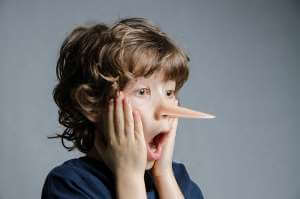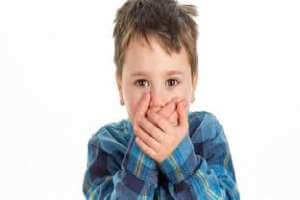Lying when children Lying is a common behavior among children. It can develop in early childhood and continue into the teenage years. However, the reasons for lying in children change with age. Lying is one of the earliest antisocial behaviors that children develop. When dealing with lying in children, it is important to consider your child's age and developmental stage, the type of lies used, and the possible reasons behind this behavior. Lying can sometimes occur with cheating or stealing. When this behavior occurs repeatedly and over a long period of time, it may indicate a more serious problem.

The basic rule for dealing with lying behavior in children is to know the reasons and motives for lying, then determine its forms before we begin treatment. It must be prevented.
Are you watching: Scoliosis in children and its treatment?
Types of lying in children
Until your child understands the difference between truth and fiction, lying may not be intentional. Your child Also, to mature to the point of having a conscience to understand that lying is wrong, researchers at the University of Arizona classified lying into the following categories:
pro-social lying: Prosocial lying occurs when a child lies to protect someone else or to help others.
Lying to enhance oneself: The purpose of self-deception is to avoid consequences such as shame, rejection, or reprimand.
Selfish lying: Used for self-protection, often at someone else's expense or to hide misconduct.
Antisocial lying: It is lying with the intention of intentionally harming another person.
Reasons for lying in children
Lying occurs for various reasons as children grow up. Children under three years of age typically do not lie intentionally, as they do not always know they are lying. At this age, they are too young to have a moral code by which to judge their lies. Their lies may be a test of language use and communication.
Children between the ages of 3 and 7 may not be able to distinguish between reality and fantasy. Their daily activities often focus on imaginary classmates and pretend play. They may not realize that they are not lying, so lies may be unintentional.
By the time most children are seven years old, they usually know the definition of lying. They may be taught that it is morally wrong to lie. They may be confused by the double standards that allow parents to lie. Older children may test adult rules and boundaries by lying. When they lie intentionally, children may try to:
- Hiding the fact that they did not meet their parents' expectations
- They claim to succeed in school or another activity if they feel that parents will not accept their failure.
- Explain why they did a certain action if they are unable to give another explanation.
- He doesn't get attention in relationships where praise is not given.
- avoid doing something
- deny responsibility for their actions
- Protects his privacy
- feel independent from their parents
Lying is a common symptom among school-age children, and it is more common in boys than girls. Children are more likely to lie when they are under a lot of pressure to achieve unattainable goals. If a parent is likely to overreact and be too negative, this may push the child to lie to avoid consequences.
If your child has attention deficit hyperactivity disorder (ADHD), he or she may not be able to fully control lying. A child involved in drug or alcohol abuse may lie to hide these activities.
Are you watching: The 14 best ways to treat fever in children at home?
Symptoms of lying in children
There are no sure signs that your child is lying. However, if your child is lying, some common symptoms are:
- Unbelievable words
- Inconsistency when retelling the story
- a look of fear or guilt
- Lots of enthusiasm in telling the story.
- Lots of calm in describing an emotional story.
Are you watching: Malaria in children - causes, symptoms and treatment?
Diagnosing lying in children
You may need to consult a pediatrician if lying becomes a problem. Lying that remains consistent may be a sign of a behavioral disorder, a learning disability, or antisocial personality disorder. Evaluation by a mental health professional may be necessary if:

- Lying happens so frequently that it becomes a habit.
- Compulsive lying to deal with difficult situations on a regular basis
- Your child shows no remorse for lying.
- When lying is accompanied by antisocial behaviors such as fighting, stealing, or cheating
- Lying accompanied by hyperactivity or sleep problems
- Your child lies and doesn't have many friends, indicating low self-esteem or depression.
- Lying to cover up harmful behaviors
How to deal with lying in children
Home care is essential in this case. If you realize that your child is lying, it is important to tell him or her immediately that you know the truth. When discussing the subject with your child, it is important to emphasize:
- The difference between fantasy and reality
- The fact that lying is a false alternative
- Alternatives to lying
- You expect to be told the truth.
Excessive lying may require treatment from a counselor or psychiatrist who can help your child identify the underlying causes of the lying and work to end the behavior.
Isolated lying usually does not indicate a lifelong problem. All children lie at some point. In most cases, discussing and modeling honest behavior can help your child behave honestly.

When lying is frequent, accompanied by other antisocial behaviors, or used to hide dangerous activities, professional intervention is needed. Chronic lying may be a sign that your child is unable to tell the difference between right and wrong. It may also be an indicator of problems affecting the child within the family or outside the home.
Are you watching: Treatment of malaria in children?
Avoid lying to children
You can discourage lying in these ways:
- Teach honesty in your home
- Model honest behavior in your home
- Create a home environment where it's easy for children to tell the truth.
- Avoid dishonest actions, such as lying about your age, which may confuse your child about the importance of telling the truth.
- Don't lie to children to get them to cooperate.
- Praise your children when they are honest, especially if lying is easier.
- Don't overburden your children with too many rules or expectations. They will likely fail and be tempted to lie to avoid punishment.
- Avoid punishment for lying because fear of punishment may be a reason for lying.
- Provide adequate privacy for teens so they do not lie to protect privacy.
- The child should not be accused of lying and the subject should not be discussed too much.
- Treat the child kindly and avoid punishing him so that the child does not continue lying, even if it is bad behavior.
- Guiding the child about what is right
- Encourage the child to have a second chance to tell the truth without exaggeration.
- Avoid harsh punishment and use softer punishment methods that are commensurate with the severity of the lie, such as depriving him of his homework or making him do chores.
- Have the child write an apology letter to the person who lied to him.
- Adhere to the standards of honesty you set for your child at home, and make your behavior consistent with your standards.
- Talk to your family about morals and provide honest role models for your children via video, computer, or even your own oral stories.
the source : Lying










